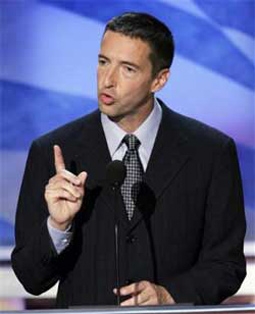
Ron Reagan is the direct namesake of the man whom many on the right consider to be “The Greatest American Hero.” Much to their dismay he has spent his broadcasting career taking aim at the very politicians who have sought to attach themselves to his father’s (the late President Ronald Reagan) conservative legacy in order to justify everything from extreme corporate deregulation to the war in Iraq.
For decades Ron Reagan has forged a path that embraces left wing ideals and touts science and progression over alleged antiquated religious rhetoric, a position that infuriates the Republican Party and warms liberals the world over. Perhaps conservatives are angry because Ron Reagan, Jr. doesn’t share the political views of his father, thus not perpetuating a proverbial Republican Camelot, or perhaps they are envious because he gets the privilege of carrying the last name Reagan, and they don’t.
Either way, Ron Reagan remains undeterred, unaffected and not at all intimidated by the legacy his name carries, or by those who try to strip him of his right to stand up for a largely Democratic agenda. Even when commentating at the Republican National Convention for MSNBC, he is not afraid to point out the many foibles and missteps he observes, and to counter with his own version of reality.
In recent years Ron Reagan’s voice has proven relevant enough to garner his own nightly, three hour syndicated radio show on Air America Media, where he interviews and challenges the so-called experts of public policy, reports on top news of the day and provides snarky commentary on everything from online social networking to our country’s current economic woes. Ron Reagan is also a longtime crusader for embryonic stem cell research as a path to medical advancement, which became one of the main themes of our conversation. We also attempted to take on some other timely and complex issues surrounding the recent implosion of American consumerism, spirituality, and the early trials and tribulations of the Obama administration.
PR.com (Allison Kugel): How did Ronald Reagan, who is a conservative icon, produce such a liberal son?
Ron Reagan: I’m not really sure. I imagine he produced me in the usual fashion (laughs).
But my folks always taught us to follow our own minds and our own conscience, and that’s what I’ve done. That’s what he did in his life. I just followed that example. I’ve followed my own mind and that’s where it led.
PR.com: Did you and your father check your opposing political beliefs at the door when you were together as a family, or did you have, let’s say, healthy debates about certain issues?
Ron Reagan: Oh, we’d argue about stuff all the time. We’d sit at the dinner table, as I got a little older of course, and argue environmental issues or things like that. You might expect that we’d be on the opposite side of issues. It was spirited, but it was always good natured. We didn’t have any terrible fallings out over these kinds of things.
PR.com: I know that both you and your mother are huge supporters of embryonic stem cell research. The fact that President Obama recently lifted the ban put in place by George W. Bush on funding for embryonic stem cell research is a huge stride. But had your mother not witnessed your father’s struggle with Alzheimer’s disease, do you think she would still have been for embryonic stem cell research?
Ron Reagan: I think there was a big and deliberate misunderstanding fostered by people who were opponents of embryonic stem cell research that the only reason my mother, and perhaps myself and my sister as well, became interested in this is because my father had Alzheimer’s disease. None of us ever imagined for a second that anything having to do with embryonic stem cell research was going to be able to help my father. That was not why we became interested in the issue. We were interested in it because it seemed like the greater good would be served by pursuing this with research. That’s why we supported it. I have to admit that I was offended to a great extent by the Bush administration’s ignoring and distorting of science, in general. Their arguments against embryonic stem cell research are an example of this: the politicization of science and the distortion of it for their own political ends. I don’t know what President Bush’s personal feelings about stem cell research were. I take it at face value that he had moral qualms about this. I’m pretty sure though, from what I’ve heard from people who have spoken with him, that Karl Rove’s position on this, and he was the one calling the shots I think, Karl Rove’s position on stem cell research was solely driven by politics and political calculation. When you’re depriving people, potentially, of life saving or life improving cures or treatments purely for political reasons, I find that to be really shameful.

PR.com: I feel as though one of the reasons the Republican Party is in the state that it’s currently in is that they began using Christianity and Jesus as a political weapon, and now they’re suffering the backlash for it.
Ron Reagan: Yes, well they embraced a particular brand of Christianity, which is fundamentalist Christianity with a literalist view of the bible. That biblical literalism only goes so far. If you begin to pin people down about Deuteronomy and things like that, and slaughtering your own child for the sin of apostasy, well all of a sudden it becomes very metaphorical, and they begin backing off of that literal interpretation. The bible has a lot more to say about being good to the poor and treating your neighbor as yourself then it does about abortion, or rights for gay people or anything like that. But those are the issues they tend to fixate on. The bible, of course, says absolutely nothing about embryonic stem cell research. In fact, in the Jewish bible a fetus isn’t regarded as a full fledged entity until the fortieth day, at the so called “quickening.” So in that sense, from the bible’s standpoint, it’s a very different picture.
PR.com: How are these stem cells harvested from an embryo, and how can they be used to potentially cure certain diseases?
Ron Reagan: The hope is that you can study the advancement and development of disease by studying it in the cells of people that actually have a genetic disease. But where you get these stem cells, there are a variety of ways. If we’re talking about embryonic stem cells as opposed to endured reduced pluripotent or adult stem cells, which nobody seems to have any ethical problems with because the word “embryo” never appears, you can get your embryonic stem cells one of two ways. You can go to an IVF clinic where there are leftover embryos, so to speak. People don’t need them to be implanted in order to have children, and you can take those with permission and derive your stem cell lines from those by removing the embryonic stem cells which are in a blastocyst. We’re actually talking about pre-embryos here. Technically speaking, it’s not an actual embryo yet.
PR.com: What I was driving at is the definition of an embryo. In the first two months of pregnancy the baby is called an embryo, yet at the end of that second month, though it’s still technically an embryo, you can hear a heartbeat and so forth. So where’s the line there?
Ron Reagan: You’re talking about something that’s quite different from the quote un-quote “embryos” that you get from an IVF clinic, and very different from the kind that would be developed in a laboratory. Until a fertilized egg is implanted in the uterus my understanding is it’s not an embryo. It’s a blastocyst, or a pre-embryo. For the first couple of weeks it is basically a container for stem cells. Body parts haven’t begun to differentiate yet. The cells are simply dividing and multiplying. Years ago Orrin Hatch was trying to move legislation through that would allow federal dollars to be spent on research for IVF embryos. People seem to fixate on this idea that they’re leftovers and they’re going to be thrown away. Well, you’ve got to examine the sort of ethical or moral issues around that reality. If you’re upset that embryos, or pre-embryos might be destroyed in order to research for lifesaving therapies or cures and you think that can’t be done for moral reasons, well why would you think that IVF clinics ought to be able to throw these embryos in a dumpster instead?
PR.com: And that’s exactly what would happen to them if they were not used for scientific research?
Ron Reagan: They would remain frozen but eventually they would run out of room, and if nobody claimed them or did anything else with them, they get thrown out.
PR.com: Conservatives are trying to paint this portrait of a scary science fiction movie where we’re creating life just to do experiments on it. I think that’s the misconception, and that is what they are proselytizing to the public.

Ron Reagan: Yes, the idea that somehow this is going to turn into a human reproductive cloning experiment where babies are born so that their organs can be harvested, and things like that. You find all kinds of bizarre science fiction representations. But again, your IVF clinic embryo is an actual pre-embryo or blastocycst that was created with the intention of creating a new human being. It’s a unique genetic entity where the combination of the mother and the father was created in the way that most embryos are created, with a sperm meeting an egg, albeit with a little technical help in the case of an IVF clinic. On the other hand, you can get your embryonic stem cells by making them in a laboratory taking your skin cell and a donor egg, taking the nucleus out of that egg so you’ve rendered it genetically inert where essentially it has no DNA anymore. You put your skin cell where the nucleus of that egg used to be, then you hit it with some chemicals and magically enough it begins to act as if a conception has taken place. But no conception has ever taken place. This is essentially a fake embryo. It’s not a unique genetic entity.
PR.com: Without sperm.
Ron Reagan: Sperm never enters the picture, and a whole egg never enters the picture. We’re essentially talking, if you will, about an egg white (laughs). So the confusion for me and I think the confusion among politicians is why should the IVF embryo have a lesser moral status than the laboratory created embryo? The IVF embryo is a unique genetic embryo. It was created with the idea of creating a new human being, whereas the laboratory created embryo is not. Sperm never met egg and it was never intended to be a human being. When the compromisers say to themselves, “Well, we can use the leftover embryos from the IVF clinics,” it doesn’t make any sense. If anything, if you’re going to assign moral value to any of these embryos, clearly the higher value would go to the IVF embryo and not the laboratory created one. There’s a great deal of confusion and scientific illiteracy around this issue, and among politicians. You, yourself, when I mentioned the laboratory created embryos, you seemed surprised at the idea that sperm never met egg in there.
PR.com: I absolutely was, and I don’t claim by any stretch of the imagination to have all of the information. I feel you have a great deal more information than I do, yet I consider myself a well-read person. So I can only imagine how little most people know about this. If, as a country, we’re only as strong as our weakest link then we’re in a lot of trouble.
Ron Reagan: You make a very good point. We are in trouble. We make decisions about things that we really don’t know anything about. I’m not a scientist. Obviously, I’ve read about the subject because I’ve had to speak about it. But this is fairly basic stuff. I understand how embryonic stem cells are created in a lab, and that’s how it’s done. It doesn’t involve sperm meeting an egg. It doesn’t involve a unique genetic entity. I don’t understand why so few people seem to get that, and I think we’d be having a very different discussion now if the public, and if politicians really understood that that was the case.
PR.com: You always hear about spinal cord injuries, Alzheimer’s disease, Parkinson’s disease and Diabetes in discussing the potential for these stem cells…
Ron Reagan: Alzheimer’s is probably a trickier thing. I think the Alzheimer’s has crept in there mostly because of my father. At some point maybe there could be a treatment for Alzheimer’s, but the first one down the pike… there are clinical trials about to start on spinal cord injuries. But Parkinson’s, yes and Diabetes; those are the ones that are probably first up. With pancreatic cells that don’t produce insulin anymore, if you could produce embryonic stem cells from a person’s skin cell and [use that to] produce healthy pancreatic cells and inject them into the pancreas, they will act as a sort of repair kit and begin producing insulin. This is probably still five years or so before we are talking about clinical trials. The other thing you could do though, and this could be happening much sooner, is if you take the skin cell from a person who suffers from Diabetes or Parkinson’s disease and you create a stem cell colony based on that skin cell, you can study the development of these diseases and conditions at their most rudimentary, basic level. You can get to the nub of what’s causing them and you can do a great deal of good that way.
PR.com: The ban that’s been lifted is strictly on funding, correct?

Ron Reagan: The ban has been lifted on funding for embryonic stem cell research, but there’s still legislation in congress that gets renewed every year that will ban federal funding for the creation of embryonic stem cells. That’s the next hurdle to get over. Now you can at least do the studies using federal funds on existing embryonic stem cell lines that have been created with private money. But technically speaking, in my understanding, that other hurdle has to be jumped before federal dollars can actually be spent to create the embryonic stem cell lines.
PR.com: Let’s talk about Barack Obama’s first sixty days in office. We usually give a President his first report card, so to speak, after his first hundred days in office. With this President we’ve been weighing in on his performance since his first thirty days. Is the early scrutiny fair, and do you think it’s a product of the economy?
Ron Reagan: I think it’s a product of a few things. [It’s] the historic nature of his Presidency and the excitement around it, and the almost desperate feeling among the public for change. People are so eager to get past the last eight years, and finally have the feeling that maybe we’re going to join the twenty-first century after running in place for the last eight years. The fact that there’s a big financial crisis just pushes that even more. Presidents don’t often enter office with so many big calamities facing them. There’s just an eagerness to use the dipstick to see, “Where are we now? Are we improving yet?” (Laughs).
PR.com: The AIG bonus fiasco; was it Obama’s fault and an indicator of more of the same politics as usual, or do you think the fault lies elsewhere?
Ron Reagan: I don’t know that you can say it’s Obama’s fault. These bonuses were in the AIG contracts for months before he was elected. I don’t know when he found out about the bonuses at AIG. If you look at them in terms of the big picture, and I don’t mean to minimize the symbolic impact of paying people who dragged our economy into the gutter huge bonuses, but if you look at the $165 million or so in the context of $180 billion, that $165 million dollars is not really going to make or break our economy or our recovery. But there is a symbolic component there that is very important. I think it’s what’s got people upset. What disturbs me about the Obama administration, at least potentially, is that they really don’t get this. What they’re really hoping for is some kind of route back to business as usual. That this is a temporary blip, and when it blows over we can go back to our funny money derivatives and our credit default swaps and our deregulation. The idea that a large chunk of our economy is based on bundling up a bunch of bad debt and then swapping it back and forth between people, all of whom are getting a cut at every stage of the process is just bizarre. As a country we really would do better getting back to making things with real value, as opposed to inflating these little balloons of imaginary value.
PR.com: Which is how we got out of The Great Depression.
Ron Reagan: Yes, exactly. By building highways and bridges and stuff that people actually use, that have actual value to them. Anybody can drive across a bridge and appreciate the value of that bridge. But how many people actually benefit from a credit default swap? It’s a pretty narrow group of people who are basically playing this game among themselves, and to nobody else’s greater benefit.
PR.com: Do you subscribe to the “too big to fail” concept as justification for bailing out some of these companies?

Ron Reagan: I’m not an economist and I tend not to get too deep into these things, but I am suspicious of the notion that a company is too big to fail, particularly when it’s a company like AIG which basically just yields in paper as opposed to things. It seems to me we’re propping up our economy by buying things we don’t need and probably don’t even really want. We don’t fix things anymore. We throw them away and buy new. We don’t mend, we don’t save, we don’t do any of the things that our parents or our grandparents used to do. People aren’t saving enough money. They’re going into debt all the time. But what’s the answer to that? Buy more stuff. Well, we don’t need more stuff. We’ve already got too much stuff, most of us. People freak out when the gross domestic product drops by let’s say five percent. So five percent less is being produced, five percent less is being bought. Think about that in terms of your average household or your average citizen, if you decide to buy five percent less stuff. That’s probably not going to be a huge thing in your life. But apparently it’s a huge impact on the economy. Well, what happens when a lot of people begin looking around and realizing, “My God, I buy a lot of crap that I don’t need!” And they just stop buying it. Is it good for them or bad for them, or is it good for the economy or bad for the economy? Are those two the same thing?
PR.com: That is happening a lot now. People are doing some serious soul searching and looking around and saying, “What do I really need?” I know it sounds strange coming from a woman, but I can’t bring myself to buy into the whole notion of you’ve got to have this pair of designer shoes, you’ve got to have this purse, or even that you have to drive a certain type of car. I’m just not into it. I think it’s a huge scam.
Ron Reagan: It is (Laughs). There’s a problem with the assumption that consumer capitalism, of the American variety at least, requires endless growth. Gross domestic product always has to be increasing and people have to be buying more and more all the time. We live on a finite planet. You can’t just do more all the time. We’ll run out of stuff. And certainly we don’t have a big enough planet to give the six and a half billion people who live here now the sort of middle class American lifestyle that we see as the norm. We’d need four other planet earths to pull that off. So how is this going to work in the long run? And the answer is it’s not going to work in the long run, and we’re seeing that now. What scares me again about this administration, and it would be the same with any administration, is that they don’t get that. They’re desperately trying to cling to the old paradigm which they’ve somehow convinced themselves can work even though it can’t work in the long run.
PR.com: What are your thoughts on this cookie cutter system of Republicans cutting taxes and putting money back in the pockets of a percentage of the American people while raising the national deficit, and the Democrats coming in and raising taxes which makes many people become more cash poor, yet balances the budget somewhat? Can’t there be a third option somewhere?
Ron Reagan: It has to do with political patronage. The Republicans cut taxes for the sort of people who fund their campaign, and by the way, the Democrats do too. The Democratic Party and the Republican Party are not as far apart as partisanship would sometimes suggest. They both buy into the same failed paradigm, basically. The Republicans are just more extreme about it. But the fact is if you want certain things from your government and your society, you’re going to have to pay for them one way or the other. The way we do that is through the tax code. You want to keep running deficits, fine. Keep spending six hundred billion dollars a year on our military. But if you want roads and clean water and a healthcare system and things like that, something’s got to give. For most people in congress and most politicians, the priority is, “How do I get re-elected? How do I get my campaign funded? Whose back do I need to scratch to make that happen?”
PR.com: Do you think the Republican Party has been exploiting your father’s legacy?

Ron Reagan: Well, sure (laughs). Who else’s legacy are they going to exploit? The first George Bush, they weren’t really crazy about him. It wasn’t a distinguished Presidency. With the second George Bush, nobody’s going to touch that. Eisenhower is going back a little too far, and besides, he had that speech about the military industrial complex, and that gets [the Republicans] a little nervous too. He also increased social security payments and they don’t like that either. So of course they exploit [my father’s] image and his name. His name is spoken more than any other Republican’s name during the conventions and during campaigns. Half of them don’t know what they’re talking about.
PR.com: It seems like when they’re backed into a corner they pull the Ronald Reagan card out of their pocket.
Ron Reagan: It’s like pulling the God card out of your pocket, I guess. If you put Ronald Reagan on the table the argument is over. “Oh, well Ronald Reagan did it so I guess we’ll have to do it too,” or “Ronald Reagan wouldn’t do that so I guess we can’t either.” Ronald Reagan took office nearly thirty years ago. It was a different world. There was a different economy. It was a whole different thing. We can argue about whether what he did back then was the right thing to do then or not, but it wouldn’t be the right thing to do now. And even he wouldn’t have thought that, I would think. Things change and times move on.
PR.com: I’m curious to know why you disclosed the fact that you’re an Atheist when it’s actually a private thing, meaning you didn’t really owe anyone an explanation.
Ron Reagan: When I first said it publicly I didn’t think of it as a terribly big deal. It was a response to a question about whether I would run for elected office, and I get that with some frequency, or I have during my life. The easiest way to shut that conversation down (laughs) is to say, “Yeah, but I’m an Atheist, so I could never be elected.” People get that right away, “Oh! Ok, I guess not then.” It’s like saying, “Well, I’m a drug addict and I don’t plan to kick heroin, so I can’t be President.” But there was such a response to that in some circles that it struck me as interesting that people would get so up in arms when somebody simply acknowledges that they’re a non-believer.
PR.com: Are you a non-believer in organized religion, or are you a non-believer in that you don’t believe in any kind of higher power?
Ron Reagan: I’m sure there are all sorts of higher powers like electro-magnetism and gravity, and things like that. But I don’t believe in a deity, no. I see no evidence for that in my life or anywhere else in the Universe. Personally, people can believe what they will and they will believe what they want. I find that most deism, and certainly most theisms take a fairly narrow view of the Universe, and most people’s views of God or Gods seem to be rather impoverished. The Universe itself, the physical world that we can perceive with our senses and grasp with our minds, seems to be far more wondrous then most people’s conceptions of a deity.
PR.com: Do you believe in a soul apart from the body?
Ron Reagan: No, I don’t see any evidence of that either. I believe in a mind. We have minds, we have consciousness, but I don’t know what a soul is. When you ask people to describe it, it’s like when you ask people to define God. Things get rather vague. It’s intriguing to me that people order their lives around a concept that few of them can actually offer a satisfactory explanation for. What is God? Is it an entity, a he, a she, an it? And where is it? Nevertheless, people profess to know all about this God and what this God wants, and what this God intends for us, and how this God would feel about this or that drug that you might use or sexual partner you might be interested in. It’s a remarkable thing that there’s this deity out there that’s magnificent and subtle enough to create the entire Universe with all its mysteries, yet people seem to know the mind of this deity. And curiously, the mind of the deity seems to match theirs almost exactly. Very few people worship a God whose ideas don’t seem to match theirs.
PR.com: I’ve listened to your radio show (The Ron Reagan Show) and I’ve seen some television interviews that you’ve done recently. I noticed that when conservatives come at you in a condescending or confrontational manner, you seem extremely at ease and amused by it. Your feathers don’t get ruffled very easily. Is that for real?

Ron Reagan: Yeah, I suppose so. Occasionally I’ll come back at somebody depending on who they are and what they’re coming at me with. For instance, we had John Ziegler [on the show] a little while ago. He was promoting one of his videos about how the press is all in the tank for Obama, and Obama’s a communist or whatever the hell he was talking about. I watched a clip of his interview with Matt Lauer, and I’d never talked to him before but I recognized the type. Ann Coulter belongs to this type where they begin attacking whenever they get a question that they perceive to be confrontational or hostile. They begin a personal assault on the interviewer as a way of deflecting attention from the real issues, which they can’t really discuss, so they need to make it a personal fight. I knew this was going to happen with John, and I figured I don’t have very long with him and he’s a radio host, so if I give him too much reign he’ll just take the five minutes and run with it, and I’ll never get a word in edgewise, so I better get in his face early (laughs) and let him know that’s not going to happen. Even though it means we’ll end up yelling at one another for a few minutes, which is what happened. But most of the time, no, I don’t feel terribly threatened by people who disagree with me. Sometimes I’ll learn something. I’m perfectly open to changing my mind if a better idea comes along.
PR.com: My last question for you is kind of lighthearted. When you go swimming are you the type of guy who will just dive right in without checking the temperature, or do you have to dip your toe in, and put one body part in at a time?
Ron Reagan: I will admit that I do check the temperature of the water before I dive in. Then I dive in, generally. But just in case it’s really cold (laughs), before I go the full plunge I’ll usually dip a hand in.
PR.com: So you’re one dip and then the full plunge (laughs).
Ron Reagan: Yeah, one dip and the full plunge. Sometimes I do some backpacking up in the mountains here. We’ll go camping and camp beside an Alpine lake which is generally, even in late summer, really cold. There you don’t just want to throw yourself into the fifty degree water. Your heart could stop. I generally splash a lot of water on myself first to prepare for that. My father taught me that, swimming in the cold ocean down in California where the water tends to be cold well into the summer. He said, “Take some of that water and put it on the back of your neck first just to alert your body that cold is coming. Don’t just throw yourself into the icy water.”
Ron Reagan’s radio show, “The Ron Reagan Show,” is nationally syndicated through Air America Media and airs weeknights from 6-9pm ET and can be streamed live online at airamerica.com. Visit airamerica.com/stations for local stations.
